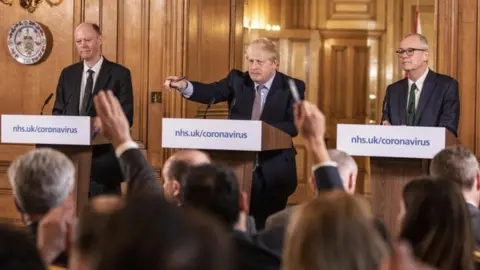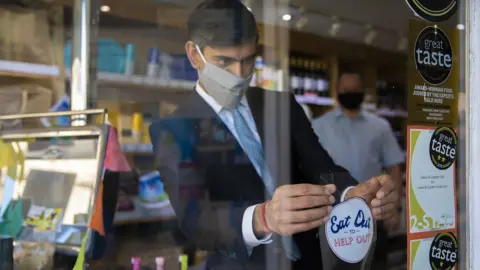How inquiry is exposing deep flaws in Covid decision-making

 PA Media
PA MediaWith each passing week of the Covid inquiry, it is clear there were deep flaws in the way decisions were made and information provided during the pandemic.
And it was both politicians and scientists making mistakes.
This much was clear from the evidence given by four of the government's top Covid scientists this week.
Experts advising government had underestimated how fast the virus was spreading and overestimated the extent to which it could be controlled.
Sir Patrick Vallance, who was the government's chief scientific adviser in the pandemic, admitted as much when he appeared before the inquiry on Monday.
He said the scientists had been "wrong" to think they could apply measures such as restrictions on socialising short of a lockdown with precision to produce a manageable wave of Covid over the summer - as was the plan up to mid March.

More on Covid and the Covid Inquiry

This came to a head on the weekend of 14 and 15 March 2020 when new data suggested the NHS was at risk of "imminent" collapse.
That kick-started a series of warnings to the public that ultimately led a week later to the full lockdown, but by that point the virus had seeded so far across the UK that many of the 40,000-plus deaths seen in the first wave were already baked in.
Breadth of expertise
But it was not just that misstep at the start, the breadth of expertise advising ministers also appears questionable.
England's chief medical officer Prof Sir Chris Whitty told the inquiry he was more cautious about imposing restrictions than others on Sage, the government's scientific advisory body, because of the indirect harms they cause to mental health, deprivation, education and wellbeing (although he agreed once the experts had realised how far Covid had spread there was little other option than to lockdown).
Sir Patrick also recognised this difference in view, pointing out it was natural as Sir Chris had responsibility for the wider health of the population in his remit.
But the rest of Sage was dominated by infectious disease experts who were focussed on what the virus was doing. It means there was little formal attempt to measure or quantify the knock-on effects of what was a completely unprecedented policy.
Outside of Sage this also seems to be the case. There was no equality impact assessment, for example, which is one of the ways government can consider the costs and benefits of a decision.
Others have questioned this approach. Last month Prof Mark Woolhouse, an infectious disease expert at the University of Edinburgh, who sat on one of the government's Covid committees providing advice into Sage, said he was not aware of anyone looking at the wider harms. It is difficult to see how "balanced judgements" could be made without that work being done, he added.
And three years on, those harms are all too clear. Rising rates of mental health problems in the young, record-high hospital waiting lists and continued attendance problems at school.
Missed opportunity
But what about later on? Prof Dame Angela McLean, who is now the overall chief scientific adviser but held the Ministry of Defence department post in the pandemic, told the inquiry that a "cross-government commission" should have been set up in summer 2020 to "pause and think" about the wider picture.
"It was a missed opportunity", she said, before adding that was with the benefit of hindsight as she had never asked for it.
A consequence of this was that Sage came to define the debate. Its meeting papers were pored over by the media and commentators when they were published and used to suggest scientists were calling for action when in reality Sage was only providing information for ministers to make decisions.
But because they focused solely on the consequences of doing something or not, there was no counter narrative of what those options would mean for the economy, education or wider wellbeing.
If ministers decided not to act, and as 2020 progressed the devolved nations started to make different choices, they were accused of not "following the science".
Sir Chris told the inquiry that phrase ended up becoming a "millstone around our necks".
There were "no good choices", he said, and so it was always the job of democratically-elected politicians to weigh up the options.
"I was - and Sir Patrick was - very careful not to say 'I think you must…'", he added.
 HM Treasury
HM TreasuryThe flipside of this is that other parts of government came to resent the scientists. Rishi Sunak, diary entries from Sir Patrick suggest, remarked in one meeting it was about "handling the scientists, not the virus".
The Treasury ended up doing its own thing. Nowhere is that clearer than in the decision by Mr Sunak, who was then the chancellor, to introduce the Eat Out to Help Out campaign in August 2020, offering diners discounts to try to boost the UK hospitality industry following lockdown.
Sir Chris, Sir Patrick, Dame Angela and also Prof Sir Jonathan Van-Tam, who was Sir Chris's deputy during the pandemic and gave evidence on Wednesday, told the inquiry they had not been consulted on the scheme despite the inherent risks it carried.
Sir Jonathan said he first heard about it from a TV report and went on to say the scheme "didn't feel very sensible to me".
Bunny hopping
The scientists were also left frustrated by the lack of strategic direction from ministers. Sir Patrick said he was never entirely clear on what the actual aim of government was beyond stopping the NHS getting overwhelmed.
Never, despite repeated attempts, he said, would ministers define what was acceptable in terms of the number of deaths or what exactly stopping the NHS being overwhelmed meant.
Dame Angela made a similar point, saying: "If you are not told what is the objective, it makes it very difficult..."
In the end, she said, the scientists came up with their own objective focused on where the country was in terms of the peak in hospital admissions from the first wave.
The lack of joined-up thinking was unhelpful - and in the autumn of 2020 it led to the country "bunny hopping" around, in the words of Sir Chris, between opening up and slamming on the brakes.
Finding a more coherent approach to decision-making in a pandemic - balancing all the trade-offs - is at the heart of what this inquiry needs to do.
